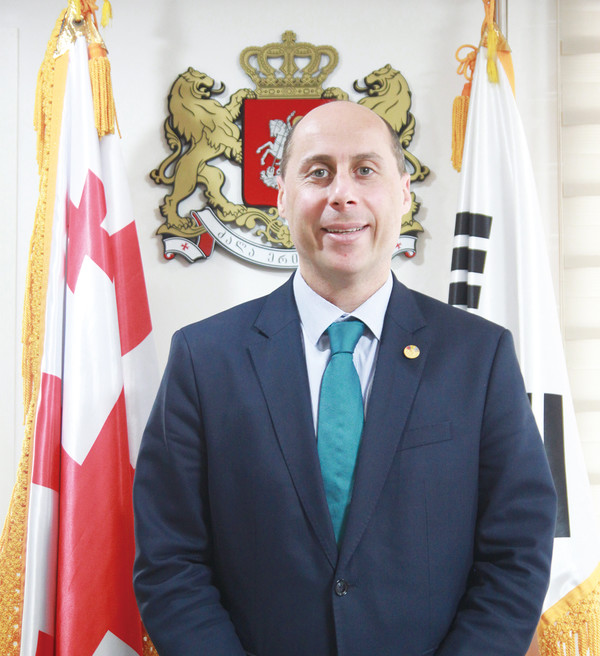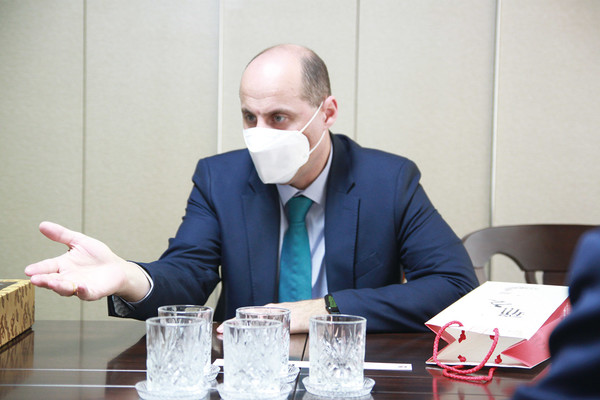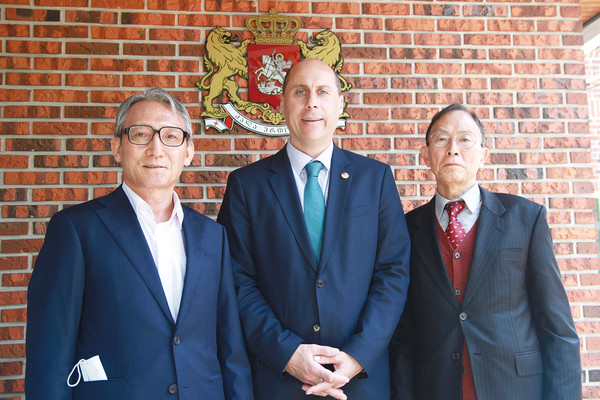
Q. Please tell us the significence of your Independence Day, May 26th for our readers.
On March 31, 1991, Georgians motivated by the April 9 events voted in a referendum for independence from the Soviet Union. With a 90.5 percent turnout, 99 percent voted in favor of Georgia’s independence.
The referendum posed a single question: "Do you support the restoration of the independence of Georgia in accordance with the Act of Declaration of Independence of Georgia of May 26, 1918?" (Georgia declared the first democratic republic by adopting the act of independence in 1918, however, this was short-lived independence as the country was re-invaded by Russia’s Bolshevik Army in 1921).
On April 9, 1991 on the second anniversary of the tragedy, the Supreme Council of the Republic of Georgia proclaimed Georgian sovereignty and independence from the Soviet Union based on the results of a nationwide referendum. This year Georgia marks 30 years since the restoration of independence.
The Act of Restoration of State Independence of Georgia states: “The Republic of Georgia, striving for a dignified position in the world community of nations, recognizes and ensures equally all the fundamental rights and freedoms of individuals, including national, ethnic, religious and linguistic groups, envisaged by international law, as required by the Charter of the United Nations, the Universal Declaration of Human Rights, and international pacts and conventions.” The country declared itself a legal successor of the earlier Democratic Republic of Georgia.
Restoring independence to Georgia created a new context for the Russia’s imperial politics to emerge. The events of April 9 triggered further aggression, and they were soon followed by civil war that caused thousands of Georgian citizens to leave their households for good. These events subsequently became the precondition for the new wave of hybrid treats emanating from Russia seeking to impede Georgia’s military, economic, and social stability.
After 1991, the Russian Federation ignited and participated directly in two conflicts on the Georgian territory-in Abkhazia and the Tskhinvali Region/South Ossetia. Russia not only supported separatist movements in these regions, but contributed to brutal killings and ethnic cleansing of the Georgian population through direct involvement of its army. As a result, up to 50,000 people died in Abkhazia and the Tskhinvali Region in the beginning of the 1990s and up to 300,000 Georgians and other ethnic groups were forcefully displaced from their homes. Conditions in both regions escalated to armed hostilities, where Russian-backed separatist forces defeated the newly-formed, weak, and fragmented Georgian military forces. Hundreds of thousands of ethnic Georgians were expelled from those regions.
April 9 had a significant impact not only on Georgia, but on the whole Soviet Union. People living under communist governments began to question the regime and its values. Many were inspired by the Georgian example to fight for their own independence.
As soon as Georgia’s aspirations towards European and Euro-Atlantic integration became clear, Russia strengthened its efforts to maintain Georgia under its direct political influence and control using old and new tactics.
In August 2008, Georgia once again became a victim to Russian aggression. The Russian Federation once again ignored the fundamental principles of the international law and blatantly violated the principles of territorial integrity of a sovereign country by launching a full-fledged military campaign on Georgia on land, at sea, by air, and in cyberspace that wrought tremendous devastation.
The armed conflict escalated the ongoing ethnic discrimination against Georgians in the occupied territories and created the context for another wave of ethnic cleansing. 130,000 IDPs have fled the villages, 53 Georgian villages and 35,000 houses were burnt and destroyed, and over 125 villages were cleansed and occupied.
Despite the 2008 Ceasefire Agreement and continuous appeals by the international community, Russia continues to violate the terms of the agreement by stimulating the aggressive separatism in the regions. It also has fortified the occupation line by installing barbed wire fences and other artificial barriers, dividing families, and depriving the residents of the region their right of freedom of movement.
The Government of Georgia remains committed to peaceful conflict resolution, for example via the Geneva International Discussions and the Incident Prevention and Prevention Mechanism (IPRM) to voice its concerns and keep international society informed. Sharing progress that has been achieved so far with the people living in the occupied regions remains one of the major priorities of Georgia’s engagement and reconciliation policy. For this purpose, the Government of Georgia has launched a specially designed initiative “A Step to the Better Future.”
Georgia is located in a very complicated region where most of the threats of the 21st century are in some form represented. The forcible violation of one country’s sovereignty by another is chief among them.
Georgia’s integration in European and Euro-Atlantic communities and structures, together with protecting its sovereignty and territorial integrity, remain top priorities for Georgian foreign policy.
Georgia is a remarkable example of democratic and economic transformation. Georgia has passed all Western tests for maturity. Georgian society is open, free, and inclusive. Its economy is competitive and vibrant, showing substantial growth despite Georgia not possessing rich natural resources. Georgian cities and villages are safe and full of Western tourists. Georgia’s political, military, and economic elites are Western-educated and Western-minded.
Georgia is a leader in the region in terms of democratization and sustainable development. Georgia has created one of the best investment climates - effective public services, corruption free government and free, fair and transparent business environment, which was reflected in international institutions ratings and continues to improve.
Georgia has restored its independence, and it continues to battle to restore its full territorial integrity. The people of Georgia are optimistic that this fight will end only victory.
Georgia’s culture and past, its freedom, its unity, and its democratic state founded on European values are the key elements strengthening the political processes that will drive Georgia forward to become and even more united, inclusive, homogeneous, and future-oriented member of European Family.

Q. Please elaborate on the bilateral economic economic ties between Georgia and Korea.
In the beginning of 2021, Georgia and the Republic of Korea launched the feasibility study on possible Free Trade Agreement. Georgian Ministry of Economy and Sustainable Development along with the Ministry of Trade, Industry and Energy of Korea are conducting joint 6-month long study, which will determine in-depth trade analyses of both countries. Free Trade Agreement will deepen the partnership between Georgia and ROK and will pave the way for Georgian products to enter Korean market and vice versa.
Air Agreement
On February 4, Agreement has been signed “On Air Services” between the Government of Georgia and the Government of the Republic of Korea. Mentioned Agreement will contribute to the development of trade-economic, tourism, people-to-people relations and would lay the institutional foundation for operations of flights between the two countries.
Georgian Wine
Georgia is widely considered as the motherland of wine with eight thousand years of uninterrupted history in winemaking. There are more than 500 types of grapes in Georgia and the country’s traditional winemaking method using Qvevri has been acknowledged as intangible cultural heritage of humanity by UNESCO in 2013. Georgian wine exports to Korea grew by over 200 percent in 2020, compared to 2019.
Cultural Cooperation:
Georgia- the Cradle of Viticulture
From March 3 to April 1, the Korea Foundation and the Embassy of Georgia to the Republic of Korea hosted the photo exhibition “Georgia-The Cradle of Viticulture” at the KF Gallery. The project was implemented in collaboration with the Georgian National Museum and the National Wine Agency of Georgia.
This was for the first time when the Republic of Korea hosted scientific exposition about Georgian wine civilization and winemaking history.
KF Gallery displayed photo materials of the unique exponents of the Georgian National Museum. Through historic architectural monuments, ancient wine vessels, various ritual items, decorations, remains of Marani (sacred wine hall) and Qvevri (clay vessel) found at the archeological sites of Georgia, along with National Museum’s unique photo archive, gallery visitors were able to explore the origins and depth of 8000 years of Georgian winemaking culture. The concept and artworks of the exhibition provided local audience with an opportunity to discover Georgia as cradle of viticulture, thought offline and online formats.

Q. Please introduce outstanding Korean companies' activities in Georgia along with Georgian tourism industry.
Several Korean conglomerates, smaller and medium size companies are operating in Georgia and numbers are increasing steadily year by year, covering full spectrum of country’s investment opportunities, including following sectors- medicine, infrastructure, IT, energy and others. One of the most prominent investors in Georgian energy sector is Korean state owned company K-water.
In 2014 The Partnership Fund and Korean “K Water” concluded a 280 MW hydropower plant ‘Nenskra’ construction agreement. The potential generation of electricity is going to be 1.2 billion kw/h. The total investment amounts 1.2 billion USD.
Tourism Sector
The main characteristics are:
·Unique biodiversity: subtropical marshes, semi-deserts, alpine zones and snowy peaks, all within hundred kilometers of each other.
·More than 12 000 historical and cultural monuments, three out of which are included in the list of UNESCO World Heritage Sites.
·Over 103 resorts.
·Around 2400 springs of mineral waters.
·8 national parks and 31 protected areas.
Tourism is one of the most dynamically developing sectors of Georgian economy with significant potential for further growth.
In 2019 - 9.4 million International Traveller Trips (growth 7.8%)
In 2018 - 8.7 million International Traveller Trips (growth 9.8%)
To this end, GOG has developed 10 Year Development Plan 2015-2025, which aims to increase tourist flow to 11 million persons. Before Covid-19 outbreak, the growing number of flight destinations from Georgia’s International Airports additionally contributed to an increase in tourist flow. As of February 1st, 2020, 66 flights were performed to international destinations from Georgia’s International Airports of which 31 destinations from Tbilisi International Airport, 29 destinations from Kutaisi International Airport, 6 destinations from Batumi International Airport.
In last few years, the number of Korean tourists visiting Georgia increased dramatically. In 2019, around 30 000 Koreans visited Georgia. Furthermore, Korean Air conducted up to 25 direct flights from Seoul to Tbilisi.
Q. Please explain investment environment of Georgia for Korean investors.
Georgia, located in the Caucasus region, between Black and Caspian Seas, boasts a rich cultural heritage, warm hospitality, unspoiled nature and attractive business environment.
Although lesser known, Georgia is one of the best places to do business in the world. Over the last two decades, the country has become synonymous with successful reforms and rapid development. For eliminating large part of bureaucracy and implementing business friendly policies, Georgia was recognized by international organizations and was even hailed as a “top reformer”. As a result, a small country on the crossroads of Europe and Asia is fast becoming a regional hub for business.
Here are just some of the benefits that Georgia offers international companies today
Once a strategically important link on the ancient Silk Road, Georgia, bordered by the Black Sea, Russia, Turkey, Armenia and Azerbaijan, has prioritized reconnecting its trade links throughout the world and has established solid a Free Trade Agreement network.
In 2014, Georgia signed an Association Agreement with the European Union, which included a Deep and Comprehensive Free Trade Agreement (“DCFTA”). In 2016, Georgia also signed free trade agreement with EFTA countries, giving Georgian products duty free access to markets of Iceland, Liechtenstein, Norway and Switzerland. Since then, Georgia has concluded free trade agreements with the People’s Republic of China (including Hong Kong) and most recently with UK, which came into force in January 2021. Additionally, Georgia has FTAs with CIS countries that include Belarus, Kazakhstan, Russia, Ukraine, Uzbekistan and Turkmenistan, as well as all its neighbors, Turkey, Azerbaijan and Armenia. As a result, Georgia provides duty-free access to 2.3 billion market.
This trend of opening up more and more markets is ever expanding for the country, with General Schemes of Preference for Georgia being applied by US, Canada, and Japan, resulting in lower tariffs on 3,400 goods exported from the country. With this, a proposed series of FTAs including Georgia-Israel, Georgia-India and Georgia-U.S., are also under development. Georgia-Republic of Korea launched feasibility study on FTA in February 1, 2021.
Being a major regional transit hub, Georgia offers significant distribution channels and opportunities through newly renovated and expanded transportation infrastructure, which includes upgraded highways, internationally connected railway (connecting China and Turkey) and seaport network. The country’s three international airports – Tbilisi, Batumi and Kutaisi – provide direct access to prominent international connections.
One of the lowest operational costs :
Being business friendly country is also reflected on low operational costs. Today, the country holds some of the lowest utility costs in Europe, competitive salaries and one of the lowest taxes, which make Georgia one of the most cost effective location in Europe and the wider region. Over 75% of electricity is generated from hydro and wind, making electricity not only cheap but also green. Since 2017, corporate profit tax on reinvested profit is 0% and social security contribution is only 2%. Georgia’s stripped-down and streamlined tax scheme has produced the 3rd lowest overall tax rates in the world according to World Bank Group. Paying taxes is simple and transparent. Companies pay taxes online, through commercial banks, minimizing procedures and bureaucracy. Furthermore, the country has four free industrial zones, offering additional tax incentives.
Taxation is just one of many examples of ease of doing business. In fact, one of the first thing that you notice while getting started in Georgia is how simple and transparent everything is. Georgia ranks 7th in Ease of Doing Business index by World Bank 2020. This is not just a ranking, but rather something you can feel. For example, starting a business or registering a property takes only hours and can be done by visiting a single location. Same easiness and simplicity can be experienced while dealing with any government organizations. Getting permits or licenses or dealing with customs, everything is transparent, fair and most importantly, does not take much time.
The fact that Georgia ranks 1st in terms of - least need to interact with government while doing business - according to Trace International Matrix 2020, is one more proof of the low bureaucracy and pro-business environment that Georgia has created.
Skilled workforce:
Georgia has historically been educational center of the region, a good testament to this being the fact that today the country has more than 60 Higher education and 65 Vocational education centers produce fresh set of professionals, with over 150 thousand students graduated over last 5 years. Although impressive in comparison to the small size of the country, Georgia is yet set to strengthen its position as further with the new Kutaisi International University, which, at full capacity will host 60 thousand students. KIU operational model was developed in partnership with Technical University of Munich and will offer vocational, undergraduate, graduate, and post-graduate degree programs, as well as research possibilities in science and technology. KIU will join other high profile universities of regional importance, such as Tbilisi State University, Tbilisi Technical University and Tbilisi Ilia University, which is in collaboration with San Diego State University. Coupled with multi lingual capabilities, well reflected in booming international business services sector, Georgia is ready to offer investors skilled workforce and highly motivated talent pool that are ready to help companies reach their goals and achieve success.
Additional financial incentives:
Companies operating in the following sectors: manufacturing of electrical and electronic products; manufacturing of aircraft parts and components, aircraft repair and maintenance (MRO); manufacture of auto parts and components; export of business services / business process outsourcing (BPO); development of warehouses and logistic centers; can apply for a special FDI grant program from “Invest in Georgia”. The program is designed to reimburse part of the costs incurred for employee training and infrastructure upgrades. Together with FDI grant, manufacturing projects can acquire state owned property (land or building) free of charge. As for IT and marine companies, looking to service clients from Georgia, corporate profit and personal tax will both be reduced to 5%. Additionally, for manufacturing or hospitality projects, subsidizing loan interest payment or loan collateral is also available.
Welcoming people, unique culture and amazing nature:
Georgia is a country of scenic contrasts, diverse climates, rich natural resources and a wide variety of cultural, historic and artistic offerings. The country has something for everyone, the mountains, the sea, ancient cities, protected areas, more than 500 varieties of unique wines and one of the best cuisines in the world. Anyone, either with family or on their own can find their type of activity, be it hiking, skiing, sun bathing on the beach or raving until early morning, Georgia will leave you wanting more and fortunately, you can find that more in Georgia again.
For companies looking to find a place with great access to global markets, talented people, cost competitiveness, ease of doing business or maybe all of the above; Georgia is the right place.

